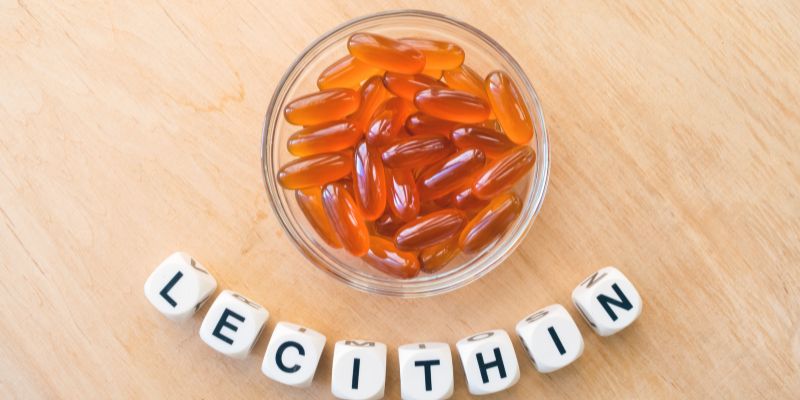What is Lecithin
Dec 23, 2023 By Nancy Miller
Are you perplexed about lecithin? You're not alone - a lot of people need to be made aware of the potential health benefits of this oft-overlooked compound.
In its most basic form, it is a nutrient naturally found in food and animal products that people have been consuming for centuries - although its importance has only sometimes been fully appreciated.
To understand how lecithin can help you reach optimum well-being, let's look at what it is and why it benefits your overall health.
What Is Lecithin

Lecithin is a fat-like substance composed of various fatty acids and other components such as phospholipids, glycolipids, and triglycerides. It is found naturally in many food sources and animal products, such as egg yolks and soybeans.
In its purest form, lecithin acts as an emulsifier, which helps keep fats and other substances from separating when mixed.
The primary component of lecithin is phosphatidylcholine, a fat or lipid-like molecule that is a major constituent of all cell membranes. It is also the primary source of choline, an essential nutrient similar to vitamin B compounds. Our bodies convert phosphatidylcholine into choline, which in turn helps support brain and nerve structure.
Uses of Lecithin

Lecithin is a collection of compounds in various foods and animal products consumed for centuries. It contains phospholipids, vital for properly functioning the body's cells.
Many people may need to be aware that lecithin has potential health benefits that can help improve overall well-being. Some potential uses of lecithin and how it could benefit your health are as follows.
Dementia or Cognitive Impairment
A 2003 meta-analysis studied the effects of lecithin on Alzheimer's disease, Parkinson's dementia, and memory issues. The results showed that while some self-reported memory improvements were seen, it was unclear whether lecithin could treat dementia.
Another study suggested that taking the equivalent of 40 milligrams (mg) per day of tacrine, an oral enzyme used to treat Alzheimer's, in lecithin, might be beneficial; however, the amount needed was not specified. A review also suggested that choline, a part of lecithin, may help reduce symptoms from head injuries.
High Cholesterol
Some studies have suggested lecithin's protective effects on the cardiovascular system and anti-inflammatory properties. In one small study, 500 mg per day of soy lecithin for two months resulted in lower total cholesterol and LDL (low-density lipoprotein) cholesterol levels. However, larger and more well-designed studies are needed to confirm these results.
Mastitis
Mastitis is an inflammation of the breast tissue that can occur in breastfeeding people. Studies have suggested that lecithin may help treat or prevent clogged milk ducts. One source suggested 1,600 mg of lecithin daily for mastitis; however, further research is needed to confirm this use.
Menopausal Symptoms
According to a study on menopausal women who were born with the gender assigned, those who consumed soy lecithin at doses of 600 mg or 1,200 mg daily felt more energised and had lower diastolic blood pressure. Again, additional study is required to validate these findings.
Tardive Dyskinesia
Uncontrolled body movements characterize tardive dyskinesia (TD) and can be due to certain medications used to treat neurological (brain) conditions.
A meta-analysis of lecithin's effects on medication-induced TD suggested that taking 20 to 35 grams (g) of lecithin daily for up to eight weeks may help improve symptoms; however, larger and higher quality studies are needed before this can be confirmed.
Ulcerative Colitis
Individuals with ulcerative colitis, a type of inflammatory bowel disease (IBD) that impacts the large intestine, often exhibit reduced levels of phosphatidylcholine, a compound present in lecithin. A meta-analysis has indicated that consuming lecithin supplements with 30% phosphatidylcholine content can enhance the outcomes for patients suffering from this condition.
Side Effects of Lecithin
Lecithin is a nutrient found naturally in food and animal products humans consume for centuries. It's generally safe to take lecithin supplements - but as with any supplement, it's important to consult your healthcare provider first.
Taking higher doses of lecithin may lead to mild side effects like abdominal discomfort or headaches, although severe side effects such as vomiting have been reported in some cases.
Common Side Effects
The most common side effects of taking lecithin include abdominal discomfort and headache. Generally, all symptoms are minor and should subside within a few days or weeks of starting the supplement. However, if symptoms persist or worsen, speak with your doctor immediately.
Severe Side Effects
In rare cases, some people have reported vomiting as a severe side effect of taking lecithin supplements. If you experience any symptoms associated with an allergic reaction - such as difficulty breathing or skin rash - stop taking the supplement and seek medical help immediately.
Precautions
It is important to take precautions when considering lecithin as a health supplement. While it has many beneficial properties, those with certain allergies or medical conditions should be aware of potential risks before consuming it.
Allergic Reaction
Steer clear of it if you are allergic to lecithin, its components, or any sources it may be derived from, such as eggs, soy, fish, or sunflowers. Additionally, it's crucial to speak with your pharmacist or healthcare provider to obtain a comprehensive list of ingredients if you are uncertain about the contents of a product.
Pregnancy and Breastfeeding
Lecithin metabolizes into choline, a vital nutrient for pregnant and breastfeeding women. The recommended daily intake of choline is 450 milligrams during pregnancy and 550 milligrams while breastfeeding.
Although there are studies indicating that lecithin could help treat or prevent blocked milk ducts, it is essential for women to discuss with their obstetrician, pediatrician, or healthcare provider before starting lecithin or any other supplements to confirm their safety.
Children
Research on the safety of lecithin for children is sparse. Consequently, it is advisable to seek guidance from a pediatrician or another healthcare expert before administering lecithin to children.
Dosage
When taking lecithin supplements, it is important to take the recommended dose. The amount of lecithin you should take depends on the condition being treated and varies between 500 mg and 35 g per day.
For example, studies have shown the following dosages:
- 500 mg of soy lecithin daily for two months is effective when taken to treat high cholesterol. Mastitis can be treated with 600 mg of lecithin daily, while menopause symptoms may require up to 1,200 mg daily.
- For individuals with tardive dyskinesia, daily doses of 20-35 grams of lecithin enriched with phosphatidylcholine are recommended for several weeks. In contrast, those suffering from ulcerative colitis may benefit from taking 0.8-3.2 grams of a soy lecithin supplement with over 94% phosphatidylcholine content for a duration of 12 weeks.
It is important to follow the instructions on the supplement label and, if necessary, consult with a healthcare provider or pharmacist before taking lecithin supplements.
FAQs
What is another name for lecithin?
Lecithin is also known as Phosphatidylcholine or PC.
What foods contain lecithin?
Foods rich in lecithin include eggs, soybeans, sunflower seeds, peanuts, whole grains, and other plant-based sources.
Is lecithin safe for you?
Lecithin is generally safe for most people, but it's important to consult your healthcare provider before taking supplements to ensure they are right for you. Generally, all side effects are minor and should subside within a few days or weeks of starting the supplement. However, if symptoms persist or worsen, speak with your doctor immediately. Severe side effects such as vomiting have been reported in rare cases.
Conclusion
Lecithin is an essential fat-like substance with numerous health benefits, from reducing cognitive impairment to helping with ulcerative colitis. However, like any other supplement, it is unwise to self-medicate and seek professional help for proper dosage and the best form of lecithin for your condition. Furthermore, taking this supplement must always consider potential significant side effects.
-
 Feb 20, 2024
Feb 20, 2024The 4 Stages of Sleep
Get a better understanding of what happens during the four stages of sleep. Learn about Awake time, light sleep, deep sleep, and REM sleep with this informative guide.
-
 Dec 03, 2023
Dec 03, 2023Early-Onset Arthritis: Types, Symptoms, and Treatment
Learn the major types of early-onset Arthritis, recognize the symptoms, and determine the available treatment
-
 Dec 13, 2023
Dec 13, 2023What Is Progressive Muscular Atrophy
This blog post explores the definition, symptoms, and treatments of progressive muscular atrophy. Discover what PMA is today to better understand your risk for muscle deterioration and how you can manage it.
-
 Oct 03, 2023
Oct 03, 2023Why are My Eyes Yellow
Is your eye color changing to a yellowish hue? Learn why this happens and the possible causes, signs, and treatments that may accompany it. Get professional advice from the Why Are My Eyes Yellow blog today!
